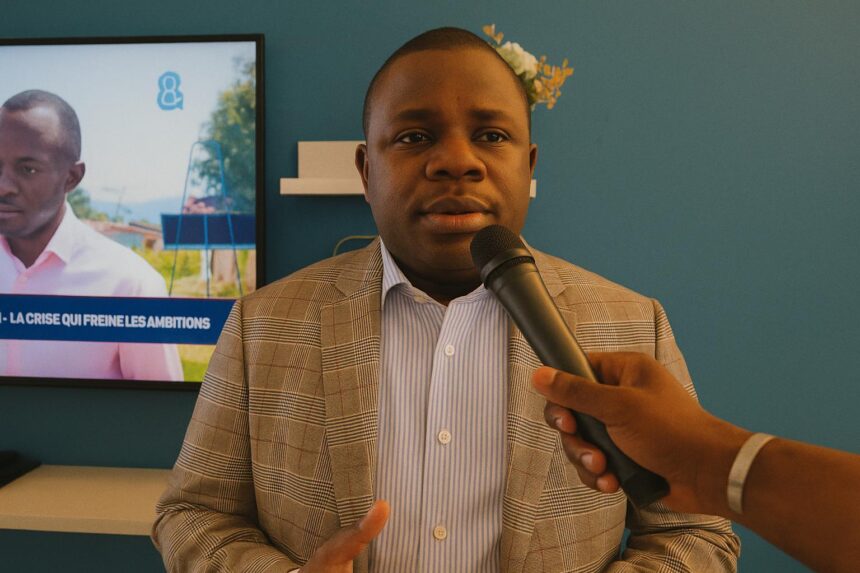A New Voice in Congolese Broadcasting
When Bilili TV went on air in May, media observers immediately noted the novelty of a digital, privately funded generalist channel emerging from Brazzaville. Its founder and general manager, veteran cameraman Géraldin Andzouana N’Kaba, framed the venture as “a commitment to do television differently” during an interview with local press. The channel enters a market historically dominated by state television Télé Congo and a handful of commercial outlets, yet its programming grid—spanning news, health, technology and traditional arts—signals an intent to diversify the national conversation rather than compete solely on ratings.
- A New Voice in Congolese Broadcasting
- Editorial Independence within Regulatory Boundaries
- Championing National Creativity on Screen
- Economic Hurdles and the Search for Partners
- Regional Reach and the Quest for Global Platforms
- Strategic Implications for Congolese Soft Power
- Outlook for a Nascent Broadcaster
Editorial Independence within Regulatory Boundaries
Congo-Brazzaville’s 2001 press freedom law, overseen by the Conseil Supérieur de la Liberté de Communication (CSLC), provides a framework designed to balance liberalisation with social stability. Bilili TV publicly reaffirms its adherence to that framework while insisting on editorial autonomy. Andzouana N’Kaba emphasises that potential investors are welcome provided they respect a non-partisan line. His position echoes recent remarks by CSLC president Philippe Mvouo, who urged new outlets to ‘innovate responsibly’ amid rising regional disinformation concerns. By coupling regulatory compliance with declared independence, Bilili TV seeks to reassure both authorities and audiences of its constructive role.
Championing National Creativity on Screen
Programming centered on Congolese cinema, documentary and music is at the core of Bilili TV’s value proposition. The approach dovetails with UNESCO’s 2022 Creative Economy Outlook, which highlights content export as a crucial driver of cultural GDP for African states. Bilili TV’s commissioning of local filmmakers—many of whom struggle to find domestic distribution—creates a pipeline that may reinforce cultural identity while stimulating jobs in production, post-production and marketing. For viewers, the promise of high-definition images and narratives that resonate with lived experience counters the dominance of imported telenovelas and reality shows.
Economic Hurdles and the Search for Partners
The Congolese advertising market remains modest at under 45 million USD annually, according to estimates from the African Media Initiative, making financial sustainability a recurring challenge for private broadcasters. Bilili TV, self-financed during its pilot phase, now courts institutional sponsors and regional brands while remaining ineligible for direct CSLC subsidies. By positioning itself as a premium window on Congolese culture, the channel hopes to attract corporate social-responsibility budgets earmarked for nation-branding. Analysts note that a measured rapprochement with development funds—such as the African Development Bank’s digital-creative facility—could supply the capital required for studio upgrades without compromising editorial independence.
Regional Reach and the Quest for Global Platforms
Distribution agreements already place Bilili TV on Sepela, Ivoire Channel, Bero Sat and TV Chaînes, giving the station an initial footprint across Central and West Africa. Negotiations with Canal+, StarTimes and Bleu Sat could extend that footprint to an estimated 30 million households. Such exposure would vault Congolese storytelling into living rooms from Casablanca to Johannesburg, amplifying the country’s cultural diplomacy. A senior executive at StarTimes, contacted for this article, confirmed ‘constructive exchanges’ with Bilili TV and praised the channel’s ‘professional production values’. While timelines remain tentative, the mere prospect of carriage on pan-African platforms underscores the station’s upward trajectory.
Strategic Implications for Congolese Soft Power
Beyond commercial metrics, Bilili TV operates within a broader strategic narrative. President Denis Sassou Nguesso’s administration has repeatedly underscored culture as a pillar of its 2022-2026 National Development Plan. A vibrant media ecosystem capable of showcasing Congolese heritage aligns with that ambition and complements recent diplomatic overtures, from UNESCO World Heritage nominations to regional cultural festivals. By cultivating domestic talent and broadcasting it regionally, the channel contributes to an image of Congo-Brazzaville as a country confident in its cultural assets and open to technological modernity. In the words of a senior diplomat posted in Brazzaville, “soft power is no longer a luxury; it is the subtle currency of international legitimacy.”
Outlook for a Nascent Broadcaster
Skepticism inevitably trails any new entrant in a challenging media market, yet Bilili TV’s early indicators—solid production quality, regulatory compliance and a culturally resonant slate—suggest room for cautious optimism. The channel’s fate will depend on its capacity to forge revenue streams without diluting its editorial ethos, a balancing act familiar to media entrepreneurs across the continent. Should Bilili TV succeed, it may not only redefine viewing habits at home but also become a test case for the role of creative industries in Congo-Brazzaville’s economic diversification agenda. For now, the on-air slogan ‘Trust the image’ encapsulates both a promise to viewers and a quiet confidence that Congolese stories can hold their own in prime time.



















